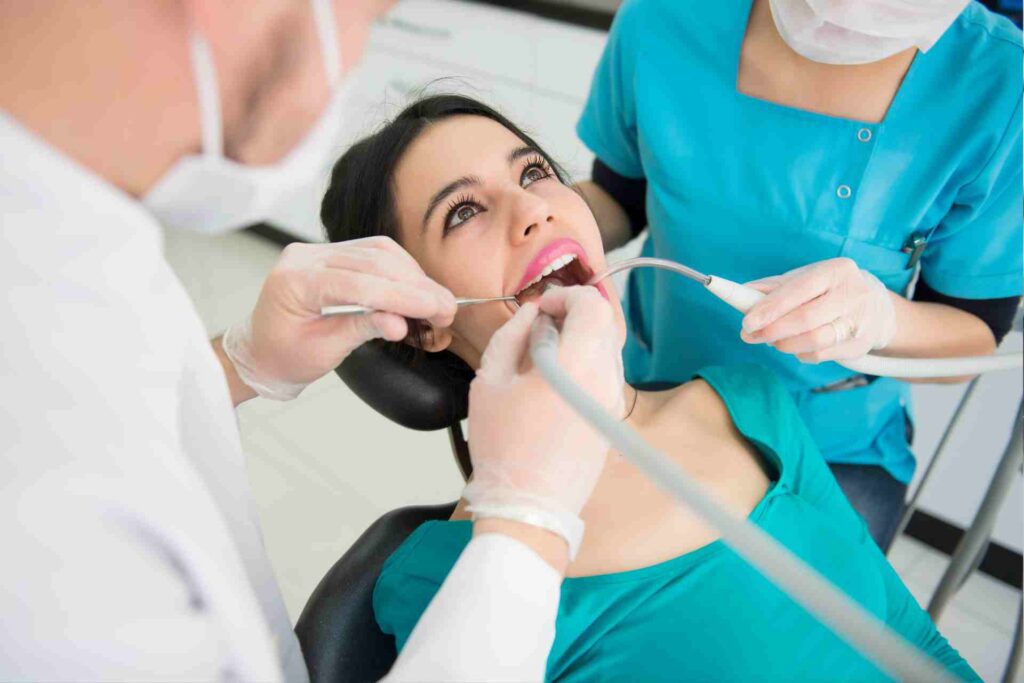Highlights:
- Wait Time Depends on the Type of Cleaning – You can eat immediately after a regular cleaning, but if you had fluoride treatment, wait at least 30 minutes. After deep cleaning, wait 2+ hours and stick to soft foods.
- Soft Foods Are Best – Eat yogurt, scrambled eggs, mashed potatoes, smoothies, and steamed vegetables to avoid irritation.
- Avoid Acidic, Sugary, and Hard Foods – Citrus, candy, coffee, popcorn, and crunchy foods can weaken enamel, cause discomfort, or stain teeth.
- Hydration is Key – Water and herbal teas help rinse bacteria and keep your mouth healthy without interfering with fluoride treatments.
- Protect Your Teeth After Cleaning – Wait a few hours before drinking coffee or wine to prevent stains, and avoid extreme temperatures if your teeth feel sensitive.
Regular dental cleanings are essential for maintaining healthy teeth and gums. They remove plaque and tartar buildup, helping prevent cavities, gum disease, and bad breath. After a cleaning, many patients often wonder about one specific question: “When can I eat?”
The answer depends on your treatment:
- Routine cleanings: You can eat immediately after leaving the office.
- Fluoride treatments: Wait at least 30 minutes before eating so the fluoride can fully absorb and protect your teeth.
After a fluoride treatment, it’s also important to avoid certain foods:
- Sticky or hard foods that could disrupt the fluoride.
- Hot foods that might irritate sensitive gums.
Why Waiting to Eat After a Teeth Cleaning Matters
Routine dental cleaning focuses on maintaining your overall oral health. During this process, your dental hygienist will:
- Remove plaque and tartar from your teeth using special tools.
- Polish your teeth, leaving them smooth and clean.
This helps prevent cavities, gum disease, and bad breath, while keeping your teeth healthy in the long run.

For patients with gum disease or significant plaque buildup, a deep cleaning (also known as scaling and root planing) may be recommended. Unlike regular cleanings, this procedure targets bacteria and tartar below the gumline to address advanced oral health concerns.
After a deep cleaning, your gums may feel more sensitive, especially during eating. Following aftercare instructions is essential to aid healing and prevent further issues.
How Long Should You Wait to Eat After a Dental Cleaning?
If You Had a Regular Cleaning (No Fluoride Treatment) – No Wait Time!
Good news! After a standard cleaning with no fluoride treatment, you can eat right away.
However, it’s best to choose soft foods to avoid irritating your gums, especially if they feel a little sensitive. Try options like yogurt, scrambled eggs, or pasta. If your gums are tender, steer clear of extremely hot or cold foods, as they may cause discomfort.
If You Had a Fluoride Treatment – 30 Minutes
When it comes to fluoride treatments, timing really matters. Fluoride helps strengthen your enamel, prevent cavities, and even fix early signs of tooth decay—all great reasons to take care of your teeth!
But to get the most out of it, you’ll need to wait at least 30 minutes before eating or drinking.
Why? It gives the fluoride time to soak in and do its job. If you eat or drink too soon, you could wash it away and miss out on its benefits. Once it’s absorbed, though, fluoride keeps protecting your teeth for the long haul.
If You Had a Deep Cleaning (Scaling & Root Planing) – 2 Hours
Deep cleanings, also known as scaling and root planing, focus on treating gum disease and removing buildup beneath the gum line.
After this procedure, it’s best to wait at least 2 hours before eating. For the first 24–48 hours, stick to soft foods like mashed potatoes, soups, or smoothies to avoid aggravating your gums. Avoid crunchy, hard, or spicy foods, as these can cause irritation and delay healing.
Best Foods to Eat After a Dental Cleaning

After a dental cleaning, especially a deep cleaning, it’s important to choose foods that won’t irritate your gums. Stick to soft and gentle options while your teeth and gums heal. Staying hydrated is equally important, as it helps promote recovery and keeps your mouth clean.
- Soft snacks like yogurt, scrambled eggs, and mashed potatoes are easy to eat and won’t strain your gums.
- Smoothies made with non-acidic fruits like bananas or avocados provide a nutrient boost while being gentle on your teeth.
- Warm (not hot) soups and soft bread are comforting choices that won’t cause irritation.
- Well-steamed vegetables like carrots or zucchini are easy to chew and full of vitamins.
Hydration is key to a smooth recovery. Water is your best friend—it flushes out bacteria and keeps your gums hydrated, promoting faster healing.
Avoid acidic drinks or foods, as they can irritate sensitive areas and slow down recovery. Staying mindful of your food choices can make all the difference.
Foods and Drinks to Avoid After a Teeth Cleaning
Maintaining proper care after a teeth cleaning isn’t just about your oral hygiene routine—it’s also about being mindful of what you eat and drink. Here are some simple tips to help protect your refreshed smile and ensure a smooth recovery.

Your teeth are more prone to staining right after a cleaning. In the first 24 to 48 hours, try to steer clear of drinks like:
- Coffee
- Red wine
- Tea
- Dark sodas
If skipping your favorite drink isn’t an option, rinse your mouth with water afterward to help reduce staining.
Some foods can irritate your gums or sensitive areas after a cleaning. Avoid items that may cause discomfort, such as:
- Popcorn
- Chips
- Nuts
- Sticky candies
- Caramel
Opt for softer foods to keep your gums comfortable and promote healing.
Acidic foods like citrus fruits and sodas can temporarily weaken enamel, leaving your teeth vulnerable. Sugary treats, on the other hand, fuel bacteria growth and increase the risk of plaque formation. To protect your teeth, choose low-acid, low-sugar options instead.
| Recommended Foods | Foods to Avoid |
|---|---|
| ✅ Soft fruits (bananas, applesauce, avocados) | ❌ Citrus fruits (oranges, lemons, grapefruits) |
| ✅ Yogurt & cheese | ❌ Sugary snacks (candy, chocolate) |
| ✅ Scrambled eggs | ❌ Sticky foods (caramel, gummies) |
| ✅ Warm soup & soft bread | ❌ Hard foods (nuts, popcorn, chips) |
| ✅ Steamed vegetables | ❌ Crunchy foods (raw carrots, granola) |
| ✅ Mashed potatoes | ❌ Spicy foods |
| ✅ Water & herbal tea | ❌ Staining drinks (coffee, red wine, tea, soda) |
FAQs About Eating After a Dental Cleaning
Can I drink coffee after a teeth cleaning?
It’s best to wait at least a few hours before drinking coffee after a teeth cleaning to prevent staining. Coffee contains dark pigments that can adhere more easily to teeth, especially after a deep cleaning.
Can I eat immediately after a cleaning?
Yes, you can eat immediately after a cleaning if no fluoride treatment was applied at the end of your visit. However, if fluoride was used, it’s important to wait 30 minutes to an hour before eating or drinking to allow the treatment to fully set and be effective.
Why do my teeth feel sensitive after a cleaning?
Gum irritation from the cleaning process or the removal of tartar can lead to temporary sensitivity. Additionally, fluoride treatments might make your teeth feel slightly different. This is normal and should subside within a day or two.
Does drinking water affect fluoride treatment?
Drinking water after a fluoride treatment does not affect its overall effectiveness. However, avoid excessively rinsing your mouth immediately after fluoride is applied. This gives the treatment time to bond with your enamel and strengthen your teeth properly.
What if I accidentally eat too soon after fluoride treatment?
Don’t worry if you accidentally eat too soon after a fluoride treatment—it’s not harmful. However, it might reduce the overall effectiveness of the treatment. To get the most benefits next time, try to wait for the recommended window of time before eating or drinking.
Final Thoughts
Proper care after a dental cleaning is essential to make the most of your visit. Here are the key takeaways for waiting times after different types of cleaning treatments:
- Routine Cleaning: You can eat right away but try to avoid staining foods or drinks for a few hours.
- Fluoride Treatment: Wait at least 30 minutes before eating or drinking to allow the fluoride to fully absorb and protect your teeth.
- Root Scaling and Planing: After a deep cleaning or root scaling, it is advisable to wait a few hours before eating.
Your oral health is in your hands! Sticking to good hygiene habits not only prevents issues like cavities and gum disease but also keeps your smile bright and healthy for life.
Stay connected with Joyce the Dentist for more helpful tips, tricks, and advice on all things dental!





















